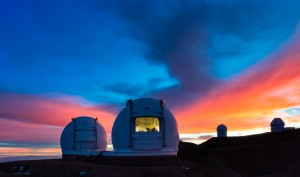Keck Observatory Highlights Exciting Year in Astronomy
As 2017 draws to a close, W.M. Keck Observatory is revisiting an exciting year in the field of astronomy and looking ahead to the future of scientific discoveries in the cosmos.
“We are at the forefront of research into the most important questions: the origins of the universe and some of its most mysterious constituents—dark matter and dark energy; galaxy formation at the earliest times; the supermassive black holes at the center of our and other galaxies; extrasolar planets and the quest for places hospitable to life; geological phenomena on the moons of Jupiter and Saturn and meteorological events in the atmospheres of Uranus and Neptune; and many other leading questions in astronomy today,” wrote Director of W. M. Keck Observatory Hilton Lewis in an end-of-year letter.
Two of three astronomers recognized with the Nobel Prize in Physics this year were members of Keck’s parent organization, the California Institute of Technology. The prize was awarded for four decades of work that led to the detection of gravitational waves—considered one of the greatest discoveries in modern astronomy.
During the past year, Keck underwent notable upgrades to further expand research efforts in the universe, including the Keck Cosmic Web Imager (KCWI)—a cutting-edge instrument that captures 3D images—and the Near Infra-Red Echelle Spectrometer (NIRES)—an infrared spectrograph installed on the Keck II telescope. Additional instrument upgrades to improve astronomical observations are already in the works with the Keck Planet Finder (KPF) and Keck Cosmic Reionization Mapper (KCRM).
Keck also introduced new programs this year, including the Keck Visiting Scholars Program (KVSP) and the Keck Science Collaborative (KSC). KVSP provides early career scientists, postdoctoral and graduate students, hands-on access to the telescopes and instrumentation. KSC provides travel and research support to resident astronomers at Keck to further joint research and publication efforts with scientists from partner institutions.
“The Keck Observatory will play a vibrant role in future follow‐up observations in this new era of discovery,” Hilton wrote in the letter.














